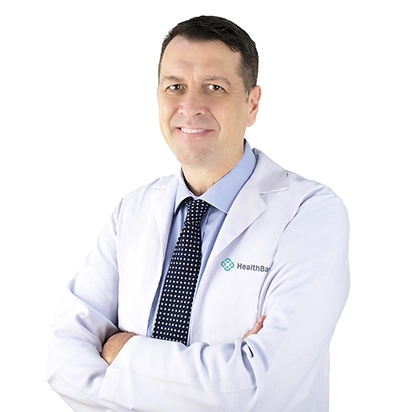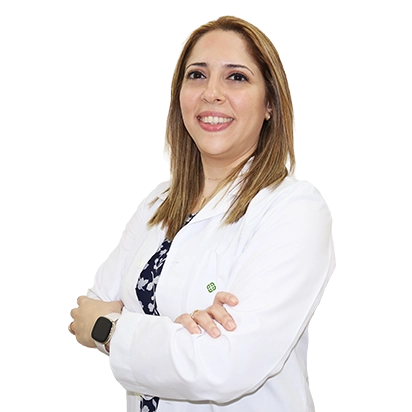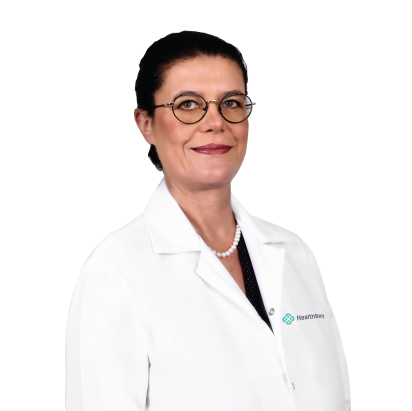
Get Free FOBT Screening Test
At HealthBay Clinic, we offer free FOBT screening tests for all individuals aged 45 and above as part of Colon Cancer Awareness Month.
- Limited Period Offer
What is FOBT?
FOBT stands for Fecal Occult Blood Test. It is a non-invasive test used to detect hidden (occult) blood in stool, which can be an early sign of colorectal cancer, polyps, or other gastrointestinal conditions like ulcers or hemorrhoids.
"Globally, the lifetime risk of colorectal cancer is approximately 1 in 23 for men and 1 in 25 for women (American Cancer Society, 2023)"
"In the UAE, colorectal cancer is the #1 most common cancer in men and #3 in women (GLOBOCAN 2022)"
Early detection saves lives. Act today!
HealthBay Colorectal Cancer Screening Programme
As part of our Colon Cancer Awareness initiative, HealthBay Clinic is offering a comprehensive Colorectal Cancer Screening Programme, including a free Fecal Occult Blood Test (FOBT) for individuals aged 45 and older. Colorectal cancer—cancer of the colon and rectum—is one of the most common cancers globally, ranking as the second to third most prevalent. It is a leading cause of cancer-related deaths in the Gulf countries and worldwide. Many patients with polyps or early colorectal cancer do not exhibit symptoms. The good news is that colorectal cancer is preventable and, when detected early, highly treatable.
HealthBay’s Colorectal Cancer Screening Programme is led by highly qualified specialists, including accredited colonoscopists, Board-Certified Gastroenterologists with decades of experience in performing colonoscopy screenings.
Our Colonoscopy Packages
COLONOSCOPY
- The package includes
- Colonoscopy Doctor’s Fees
- Histopathology / Biopsy – 2 Samples
- Anesthesia Medication
- Anesthesia Administration Charges
- Anesthesiologist Consultation Fees
- Consumables
- Facility Fees
- Post-Procedural Gastroenterologist Consultation
- *** Extra fees apply for each additional biopsy.
EGD+COLONOSCOPY
- The package includes
- Gastroscopy Doctor’s Fees
- Colonoscopy Doctor’s Fees
- Histopathology / Biopsy – 4 Samples
- Anesthesia Medication
- Anesthesia Administration Charges
- Anesthesiologist Consultation Fees
- Consumables
- Facility Fees
- Post-Procedural Gastroenterologist Consultation
Meet Our Gastroenterology Doctors

Dr. Neil Philip Galletly
Consultant in Gastroenterology and Hepatology & GCAA Specialist Aeromedical Examiner in Gastroenterology
- English
- 25 Years of Experience

Dr. Federica Fabris
Specialist Gastroenterologist/ Endoscopist
- English, Italian, Spanish & French
- 20 Years of Experience

Dr. Guinwa Khaddaj
Specialist Gastroenterologist/ Endoscopist
- Spanish, English & Arabic
- 10 Years of Experience

Dr. Regina Carla Will
Consultant in Gastroenterology, Hepatology and Internal Medicine
- English, German & Spanish
- 25 Years of Experience
What You Need to Know About Colorectal Cancer
Who Is at Risk?
The risk of developing colorectal cancer increases with age. All men and women aged 40 and older are at risk and should consider screening. Lifestyle factors that may increase the risk include:
- A sedentary/inactive lifestyle
- Low fiber intake
- Insufficient consumption of whole grains, fruits, and vegetables
- Diets high in processed food, fats, and red meat
Additionally, a family history of colorectal cancer can increase the likelihood of developing the disease. While colorectal cancer can occur at any age, it is more commonly diagnosed after the age of 40.
What Are the Symptoms?
Colorectal cancer often develops silently, without symptoms. When symptoms do appear, they may include:
- Blood in or on the stool
- Changes in bowel habits
- Stools that are narrower than usual
- Abdominal discomfort (bloating, fullness, or cramps)
- Vomiting
- Diarrhea, constipation, or a feeling of incomplete bowel emptying
- Frequent gas pains
- Unexplained weight loss
- Rectal bleeding
- Persistent fatigue or unexplained tiredness during routine activities
If you experience any of these symptoms for more than two weeks, consult your doctor immediately. While these symptoms do not always indicate colorectal cancer, their persistence requires medical evaluation.
Why Should People Be Screened?
Colorectal cancer typically does not cause symptoms in its early stages. Most cases begin as benign polyps, which can develop into cancer over time. Screening tests can detect these polyps early, allowing for their removal before they turn cancerous. Early detection increases the likelihood of a cure, with success rates of up to 90%. However, once colorectal cancer progresses and causes symptoms, treatment success rates decrease significantly.
Who Should Get Screened?
- Any man or woman over the age of 45
- Individuals with a family history of colorectal cancer, particularly those with multiple affected relatives, early-onset cases (under 50), or a history of digestive tract and gynecological cancers (ovarian or uterine cancer)
Even individuals without symptoms should consider screening. However, anyone experiencing recurrent rectal bleeding, changes in bowel habits, or persistent abdominal pain should undergo a colorectal evaluation regardless of age or family history.
What Screening Tests Are Available at Healthbay?
Colonoscopy
A colonoscopy involves inserting a thin, flexible tube with a small camera into the bowel to examine the colon. Any abnormal areas can be sampled or removed for further testing. Colonoscopy is the most recommended screening method, as it allows for the detection and removal of pre-cancerous polyps, significantly reducing the risk of colorectal cancer. It is considered the “gold standard” for colorectal cancer screening.
Histopathology – What is it?
Histopathology is the process of studying tissue samples under a microscope to diagnose diseases. During a colorectal screening, a biopsy is often performed, allowing doctors to analyze suspicious lumps or abnormal cells in the colon.
Stool Test
HealthBay offers stool tests as a non-invasive option for colorectal cancer screening. If the test detects blood or other abnormalities, further evaluation with a colonoscopy may be required. While stool tests can help identify potential cancer or pre-cancer, they are not as comprehensive as colonoscopy and may miss early-stage abnormalities.
HealthBay Clinic is committed to providing expert, multidisciplinary care for individuals at risk of colorectal cancer. Our team includes experienced Gastroenterologists, Colorectal Specialists, and General Surgeons dedicated to ensuring early detection and effective treatment.